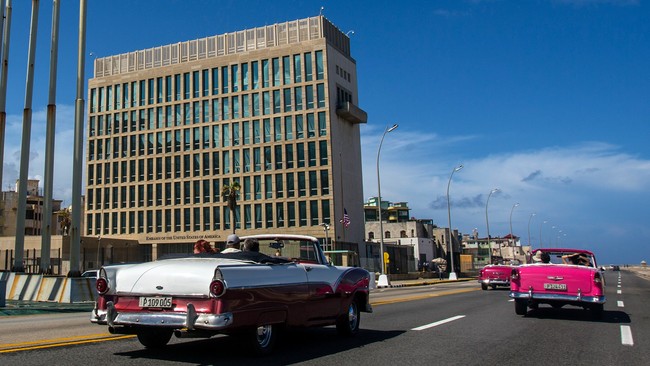The mystery about what caused severe symptoms to appear in diplomats serving in several parts of the world has deepened. An extensive study by the National Institutes of Health has found no brain injuries in repeated scans of 80 people complaining of Havana Syndrome-related symptoms.
Advertisement
The 80 diplomats were stationed in Cuba, Austria, China, and other locations around the world, and their scans were compared with a control group of 80 people in similar jobs.
The researchers clarified they weren’t trying to discover the origin of the symptoms people were suffering from. It was originally thought that some kind of “directed energy weapon” was responsible. Later, it was thought that a weapon using sonic waves was causing the debilitating symptoms.
The first reports of sickness in American diplomats came from the embassy in Cuba in 2016, hence the reason for calling the condition “Havana Syndrome.” And researchers stressed that the symptoms were real.
“These symptoms are real, and they feel it, and we acknowledge it,” said Leighton Chan. Chan was a lead author of one of the papers. “We have a third of our cases that either are not working or are struggling to work.”
The patients complained of intrusive sounds and head pressure, followed by a broad range of symptoms, including dizziness, pain, blurry vision, tinnitus, fatigue, nausea and cognitive dysfunction. Some said they heard a buzzing or high-pitched sound immediately before feeling ill.
As media reports proliferated, some national security officials speculated that Russia or some other adversary had developed a secret pulsed-energy weapon. Then Havana syndrome went global, with reports in Europe and Asia of American officials suffering a variety of symptoms due to “targeted attacks,” as then-Secretary of State Rex Tillerson put it.
Advertisement
Related: Did Feds Go too Far in Censoring Online Content About COVID? The Supreme Court Will Decide
In 2023, the intelligence community concluded there was no foreign power behind Havana Syndrome. This has led to diagnoses by process of elimination of “mass psychogenic illness.”
Once called mass hysteria, mass psychogenic illnesses are now also called functional illnesses because they trouble the conventional medical dichotomy between the brain and the mind. “I wince when I hear the word ‘psychogenic,’” Jon Stone, a neurologist at the University of Edinburgh in Scotland, told Hurley. “It creates a false impression about what these disorders are. They’re like depression or migraine. They happen in that gray area where the mind and the brain intersect.”
Early work on this theory was done by Robert Baloh and Robert Bartholomew. They co-wrote a book, “Havana Syndrome: Mass Psychogenic Illness and the Real Story Behind the Embassy Mystery and Hysteria,” postulating that once the illnesses became widely known throughout the government, it set off a feeling of general unease so that any symptoms of any kind for any reason suddenly took on a heightened psychological significance.
Advertisement
In short, Baloh and Bartholomew theorized, people talked themselves into feeling bad while others enabled the feelings.
The more studies that show no physical cause or damage due to Havana Syndrome, the more probable it is that a psychological explanation needs to be found.

